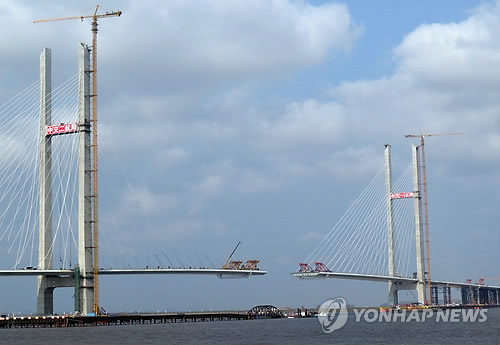- California Assembly OKs highest minimum wage in nation
- S. Korea unveils first graphic cigarette warnings
- US joins with South Korea, Japan in bid to deter North Korea
- LPGA golfer Chun In-gee finally back in action
- S. Korea won’t be top seed in final World Cup qualification round
- US men’s soccer misses 2nd straight Olympics
- US back on track in qualifying with 4-0 win over Guatemala
- High-intensity workout injuries spawn cottage industry
- CDC expands range of Zika mosquitoes into parts of Northeast
- Who knew? ‘The Walking Dead’ is helping families connect
Opening of N. Korea-China bridge ‘indefinitely’ delayed

A bridge is being built over the Amrok River, called the Yalu River in Chinese, on the border between the two communist allies on Oct. 10, 2013. China assumed all the costs for the construction of the 3,030-meter bridge, which is now delayed “indefinitely.” (Yonhap)
BEIJING (Yonhap) — The opening of a major new bridge between North Korea and China has been “indefinitely” postponed, Chinese state media reported Friday, amid Beijing’s frosty attitude toward its troublesome neighbor Pyongyang.
The report by the Global Times, a newspaper run by China’s official Communist Party mouthpiece People’s Daily, blamed North Korea for failing to build facilities for its part of the bridge as scheduled.
China’s state media have reported that the opening of the 3-kilometer, 2.2 billion yuan (US$359 million) bridge, which links the North’s border city of Sinuiju to the neighboring Chinese city of Dandong over the river, also called the Yalu River in China, had been slated for this week.
In the story headlined, “Opening Day of New China-North Korea Yalu River Bridge Indefinitely Delayed,” the Global Times newspaper reported that the bridge had been “fully completed and put into use on Oct. 30. However, it all becomes uncertain.”
Zhang Hui, chairman of a Chinese construction company behind the bridge, told the newspaper that, “Due to various reasons, construction was delayed for nearly a year.”
It was unclear whether Zhang’s comments indicated that the opening of the bridge has been delayed by one year.
A series of provocations by North Korea, including last year’s nuclear test, have strained political ties with its last-remaining ally, China. Still, many analysts believe that Beijing will not put strong pressure on Pyongyang due to the risk of aggravating the current situation.












![일본 사도광산 [서경덕 교수 제공. 재판매 및 DB 금지]](http://www.koreatimesus.com/wp-content/uploads/2024/07/PYH2024072610800050400_P4-copy-120x134.jpg)


